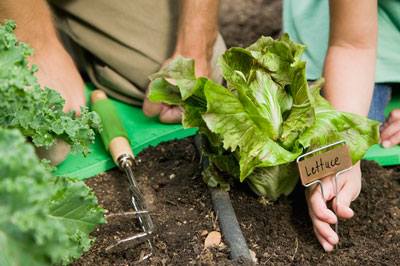
There’s been a lot of talk about eating organic in recent years. Organic foods are nothing new, but increased use of chemicals and genetic modification of crops have brought renewed interest in getting back to the basics. But if you’ve tried to go organic, you’ve probably noticed that prices on organically grown fruits and vegetables are sig nificantly higher.
Many people have turned to organic gardening as a solution. It’s much cheaper than buying your produce at the market, and you don’t have to have a huge amount of space to do it. In fact, many city and apartment dwellers have grown successful organic gardens on patios and even window boxes.
So what is organic gardening? It’s based on three simple principles:
- Feed the soil – In non-organic gardening, synthetic fertilizers are used to promote plant growth. But in an organic garden, the soil should have sufficient nutrients to produce healthy plants. Before you sow your first seed, you’ll need to test the soil. If it’s lacking vital minerals or has other problems, you can remedy it with natural solutions such as compost, mulch or chopped leaves.
- An ounce of prevention is worth a pound of cure – Today’s farming methods focus on fixing problems after they’re discovered rather than preventing them from occurring in the first place. Organic gardening, on the other hand, uses basic planting principles to keep issues such as pests and disease at bay. By growing the right kinds of plants in the right environments, keeping your garden clean and nipping problems in the bud before they become serious, you can eliminate the need to use toxic chemicals.
- Start with the simplest solution – If you find pests in your garden, dousing it with chemical pesticides may be your first instinct. But in most cases, simply picking off the offenders or spraying them off with the hose will keep them from destroying your plants. If that fails, a homemade non-toxic spray will do the trick. You can also use homemade solutions to eradicate bacterial and fungal infestations.
As any organic gardener will tell you, there are many tricks and techniques involved in organic gardening. A diverse mix of plants will help keep pests out and attract beneficial insects. You can fight weeds by using mulch and cutting or pulling them when they appear. Fungal diseases may be prevented by planting susceptible plants far apart. There are many more things you can do to ensure your organic garden’s success, but they’re all based on the above three ideas.
Organic gardening requires a bit more attention and effort than using synthetic fertilizers, pesticides and weed killers. But the rewards of great-tasting produce that’s free of toxic chemicals are well worth it. By growing organic, you can save money, help the environment and eat healthier.

